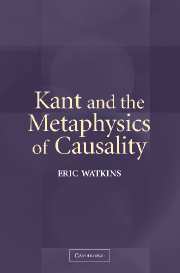PART III - CAUSALITY AND CONSEQUENCES
Published online by Cambridge University Press: 12 January 2010
Summary
If we have provided an adequate description of Kant's Critical account of causality, what follows? More specifically, is his general model of causality as described in Part II connected in systematic ways to any of his other central Critical doctrines? Does his general model of causality have any implications for what his reply to Hume might be? The final two chapters develop answers to these questions. Chapter 5 (“The Metaphysics of Freedom”) argues that Kant's metaphysical account of natural causality has implications for understanding the metaphysics of freedom, though his account of freedom also helps to clarify several aspects of his general model of natural causality as well. Chapter 6 (“Kant's Reply to Hume: Historical and Contemporary Considerations”) considers what Kant's Critical account of causality reveals about the nature of his ultimate reply to Hume and several ways in which Kant's account can be relevant in contemporary philosophical contexts.
Information
- Type
- Chapter
- Information
- Kant and the Metaphysics of Causality , pp. 299 - 300Publisher: Cambridge University PressPrint publication year: 2004
